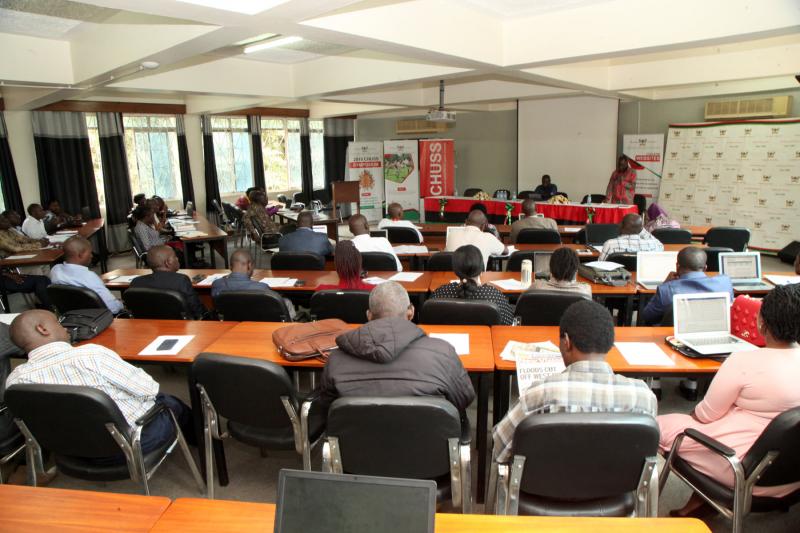
COLLEGE OF HUMANITIES AND SOCIAL SCIENCES (CHUSS)
NATIONAL HUMANITIES CONFERENCE (HumanitiesCon2021) 11th-13th August 2021
CONFERENCE THEME: Humanities and Humanistic Social Sciences Scholarship for a New Era
The historical role of the Humanities and Humanistic Social Sciences in enacting multifaceted platforms to interrogate and debate the elusive and desirable challenge of humanity and  society is self-evident. These disciplines have been critical in the study of individual responsibility, ideal citizenship and polity. By fostering critical thought and debate, they celebrate and interrogate societal commonalities and differences of what constitutes an ideal polity in spite of the numerous challenges and afflictions that are characteristic of human society.
society is self-evident. These disciplines have been critical in the study of individual responsibility, ideal citizenship and polity. By fostering critical thought and debate, they celebrate and interrogate societal commonalities and differences of what constitutes an ideal polity in spite of the numerous challenges and afflictions that are characteristic of human society.
It is unsurprising that the Humanities and Humanistic Social Sciences have been at the heart of Makerere University’s mandate of knowledge production since the introduction of Social and Historical Studies in the mid-1940s and the East African Institute of Social Research in 1948. This is attested to by the political leaders and eminent scholars that the Faculty of Arts and Social Sciences has nurtured and produced over time. They include Julius Nyerere, Milton Obote, Mwai Kibaki, Benjamin Mkapa, Oginga Odinga, Okot p’Bitek, Ali Mazrui, David Rubadiri, Nuruddin Farah, Ngugi wa Thiong’o, and John Ruganda, among others. These trained leaders and scholars embraced their generational obligation of delineating the direction of the newly liberated continent.
Today, Humanities and Humanistic Social Sciences scholars have the inevitable challenge of deploying requisite tools and methods to grapple with global challenges such as climate change, terrorism, mass migration, technological development, inequality, governance, migration, poverty, environmental degradation and pandemics, among others. For example, the recent emergence of COVID-19 pandemic has demonstrated the efficacy of the Humanities and Humanistic Social Sciences in multidisciplinary approaches, where epidemiologists need expert communicators and social workers, among others, to meaningfully engage with potentially unprecedented global socio health challenges. The rise of these challenges and their widespread impact on humanity remind us of the inescapable necessity of Humanities and Humanistic Social Sciences in building resilience and innovative mitigating strategies, if humanity is to survive.
Therefore, the purpose of this conference is to centre debates and discussions on how the Humanities and Humanistic Social Sciences can critically grapple with challenges in the era of globalisation, decolonisation, technological advancement and novel global pandemics. The scholars at this conference will seek to reimagine how these disciplines can contribute towards repositioning and re-centring the Humanities and Humanistic Social Sciences in debates on key global and national challenges.
The National Humanities and Humanistic Social Science Conference will take place at Makerere University from 11th-13th August 2021. It will bring together researchers from universities, research institutions and civil society to grapple with and interrogate how Humanities and Humanistic Social Sciences theories, historical trends and methodological innovations allow us to meaningfully reflect and dissect crucial existential challenges of the present era. The conference will seek to foster debate on the following sub-themes:
1. Multi-disciplinary conceptualising of the Humanities and Humanistic Social Sciences in the neo-liberal and globalised world
2. Contemporary theoretical and methodological approaches in the study of societal challenges
3. Humanities, pedagogies and curricula
4. Exploring the luminaries on whose shoulders we stand: histories and genealogies of Humanities scholarship in Uganda
5. Humanities and the decolonisation project
6. Humanities and contemporary development challenges, including climate change, migration, inequalities and pandemics
7. Repositioning the humanities in higher education
8. Humanities, human rights, law and governance
9. Humanities, feminism, gender and sexuality
10. Indigenous knowledge, archives, heritage and cultural memory
11. Humanities, identity, nationalism and citizenship
12. The creative industry and humanistic interventions in society
13. Humanities in the digital era
14. Imagining the future of the Humanities.
